- Home
- Paullina Simons
Six Days in Leningrad Page 15
Six Days in Leningrad Read online
Page 15
Four ounces of this bread a day. Military personnel received eight ounces. They were defending the country. They needed more.
Manual laborers got six ounces. I looked closer. My son Misha drops more than that on the floor every morning as he sucks the cream cheese off his breakfast bagel. Kevie rejoices in feeding twice that to the dogs at every meal.
I couldn’t move away from the bread. My father tugged at my sleeve.
“I can’t go yet, Papa,” I whispered.
He pulled me away to read Hitler’s instructions to his Army Group Nord on the demolition of Leningrad by hunger. Then he pulled me away to read the diary of a young girl named Tanya Savicheva, whose entire family had died in Leningrad, leaving only her alive. “Only Tanya left . . .” she wrote in her last entry.
She died too, in 1942. Now my father was the one who had to look away.
We moved away from Tanya Savicheva, from Hitler, from bread, and began studying a mercifully abstract map of the siege. A tall, thin old man stood next to me. He was silent for a moment, and then he started to speak.
His name was Yuliy Yulievich Gneze. He was seventy-six years old. At nineteen he had been a Red Army soldier fighting to defend Leningrad. When Stalin finally decided to open a second front in Volkhov, in December 1941, Gneze was transferred there to attack the Germans from the rear. On the map he showed me the places where fighting had been the most severe. He showed me why and how the Germans always sought out the highest positions from which to systematically mow down the Soviets. There were two such places around Leningrad. One was Pulkovo Heights, in the south, from where the German artillery bombed Leningrad streets for three years. The other was a place east across the Neva near the Volkhov front called Sinyavino Heights.
“Have you ever heard of Nevsky Patch?” Gneze asked me.
I shook my head. Viktor, who had been standing nearby grunted knowingly. My father, who knew everything, had long walked away from us.
“The Nevsky Patch was the slaughterhouse of Leningrad,” Gneze said. “I was nearly sent there. But I was lucky: they sent me to Volkhov instead. No one who went to Nevsky Patch came back. No one.”
“But finally . . .” I said.
“Finally, we pushed the Nazis out of Russia.”
Gneze was of German descent himself. He wore a little cap and in his hands he carried a loaf of bread. He told me that after the war he always lived close to this cemetery, and whenever he went out to run errands for his wife, he came here just to walk through the museum and around the graves.
Having been through those graves, I was stunned to hear that anyone would willingly walk through them. He must be looking for someone — brother, father, mother?
“I don’t have anybody,” he said. “They’re all dead. Except my wife. I come here just to walk through the graves. To remember.”
Gneze was touched to learn that I had come all the way from Texas to research a book about the blockade.
“I wish I had known you were here,” he said. “Are you going to be here again? Because I have so much material at home about the blockade.”
As we left the museum, Gneze walked out with us, following us to the second building. He asked if I could wait, and he would run home and get me some books on the blockade.
“I have been saving them for years and never knew why. Maybe this is just the occasion,” he said.
“Keep your books, Yuliy Yulievich,” I told him. “You should not part with your memories.”
“My memories I will not part with,” he replied. “But if the books can help you, it’s worth it.”
The second building was better lit. Instead of death, it focused on vanquishing the enemy.
I asked Gneze if the Russians and the Germans exchanged their wounded and dead. As per the rules of the Geneva Convention. He snorted at the suggestion.
“Maybe in Europe,” he said. “But not in Russia. No. It was not that kind of war.”
My father came over. “Okay, Paullina? Done?”
“Yes,” I said reluctantly, and we all stepped outside into the blinding sunshine. As we walked to our car, Gneze stayed by our side.
“See this pond over the cemetery wall? I’ll tell you something about the pond.”
I waited.
“When the Russian army collected the dead bodies for burial, they didn’t know what to do with the German corpses,” Gneze said. “At first they were going to burn them or let them rot where they fell, but in the end they couldn’t. They took pity. The Russians dumped all the Germans in one spot and covered them with earth. Later, the city decided to fill the space with water, and it became a pond. That’s the pond you see here.”
“Oh,” I said.
“Isn’t that funny?” Gneze said. “Benches all around, pedestrians strolling by, speaking softly so as not to disturb the dead.” He chuckled.
“Paullina. Ready to go?” my father said.
“Where are you going?” Gneze said, as if he wanted to come with us.
“Today, to the place we used to live,” I replied. I could see he lost interest. “But tomorrow, we were thinking of going to Lake Ladoga. To the Road of Life, you know?”
“Of course I know,” he said. “Personally I recommend Kobona, on the other side of the lake.”
“I think it might be too far for us.”
“It’s worth it. It’s got a great museum.”
“Oh yeah?” I said, watching my father slowly walk away. “Is Schlisselburg worth it?”
“Schlisselburg is a must. You cannot go to Lake Ladoga without seeing Schlisselburg. It’s incredible there. And it’s got the fortress island, Oreshek, that stood against the Nazis for a year and a half. You must go to Oreshek. No matter what.”
“We’ll definitely go,” I assured him.
“There is a wonderful museum in Schlisselburg. Not a museum really, a diorama. It opened recently, it’s all about the breaking of the blockade. It’s not far from there to Nevsky Patch. Or to Kobona.”
“We’ll try,” I said, knowing what my father would say.
“Goodbye,” said Gneze, shaking my hand. He had a firm, hard handshake, like my Dedushka.
This time I followed him. He was already down the forty steps, marking his time through the graves with the loaf of bread and his hat in his hands, half a cemetery in front of me. As I focused my camera on him, he turned around and stared at me. I took a picture, but I didn’t want to get any closer. I waved. Without waving back, he turned around and proceeded down the path.
As we climbed into Viktor’s car, I looked around for some public transportation. There wasn’t any.
“Viktor, where are the buses?”
“Oh, they stop at the Square of Courage,” he replied.
“Where is that?”
“About a forty-minute walk from here.”
You would think a bus could be re-routed to the gates of the cemetery, so that the veterans could come and pay their respects — but no, nearly sixty years later, the old soldiers, the tourists and the six-year-old girls still had to walk forty minutes.
“Where do you want to go now?” my father asked.
I was raw from Piskarev, but my father was already on to the next thing. He knew there was plenty more ahead. He was saving his emotional strength.
I looked at the map.
“See here,” I said, to no one in particular. “My map says the Defense of Leningrad Museum is off the Field of Mars, not far from the Marble Palace.”
“Oh, Defense of Leningrad,” said Viktor. “You should have said that’s what you meant. Defense is different from Siege. We can go there another day.”
“That man also mentioned there is a nice museum in Kobona.”
“Paullina!” exclaimed my father. “Be serious. How much are you prepared to do?”
“Everything.”
“That’s what I am afraid of,” said my father. “Viktor, let’s drive past Smolny Sobor. It’s beautiful, plus I used to work there.”
“What�
�s Smolny Sobor?” I asked.
“It’s a church.”
“You worked in a church?”
“Well, it wasn’t a church under the Bolsheviks.” My father chuckled. “The Bolsheviks loved the religious buildings. The Smolny was the headquarters of the Communist Party in Leningrad.”
“So what did you do there?” I asked. “I know you didn’t work for the Communist Party.”
“No. But when I was a lawyer, I went there to present my legal briefs.”
“Inside the church?”
“No, in one of the adjacent buildings. I’ll show you. The church was used as a warehouse for document storage.”
“Oh.”
Smolny was once a brilliant (now faded) blue-and-white Baroque convent, designed by the Italian architect Rastrelli, who seemed to have designed most of Leningrad. Viktor parked the car, and we stood in the open square in the front of the church as tourists filtered in and out.
“Isn’t it something?” my father said. “Ey? Isn’t it?”
It was certainly something. Would the camera hide Smolny’s peeling paint? Yes, if the shutter was softly focused and we stood far away.
“This is one of the most beautiful churches in Leningrad,” Viktor told me. “It’s a major tourist attraction.”
That made it all the more unseemly. Couldn’t the city paint the dang thing? I nodded, wondering why my father saw the beauty, why Viktor saw the splendor, while I saw only the degraded splendor.
I was no less sentimental than my father. I wanted it to take my breath away, too. I came to Russia wanting nothing less. But instead I was getting things I had not bargained for. I was getting spirits in a cemetery, and no toilet paper in the toilets, and no toilets, and rusted fences and cardboard walls and people living in partially burned down houses. Papa was getting Smolny.
“Did you like being a lawyer, Papa?”
“It was certainly ironic,” he replied. “Me defending the factory from workers’ complaints.” Indeed it was ironic: my dad, the most ardent anti-communist around, working for the government, since all factories were government-owned.
“Do you see that street over there? At the end of that street was my jail.”
Something stirred inside me. “Your jail? What’s the name of the street?”
“Shpalernaya. We called the jail Shpalerka. Take a picture for Mama of me with the street in the background. It’ll just kill her.”
I pointed my camera at my father and Shpalernaya Ulitsa, but childhood got in the way of the viewfinder. I couldn’t see the present clearly. All I saw was the past.
“Is this where I came to visit you with Mama that one time?” I asked.
“Yes,” he said. “This is where you came with Mama.”
THE BLUE SKY
“Daddy, why is the sky blue?”
“Because God made it that way.”
“Why did God make it that way?”
“Because he liked the color blue for the sky.”
“Daddy?”
“Hmm?”
“Why is the grass green?”
“Because God liked the color green for the grass.”
“Daddy, why didn’t God make the sky green and the grass blue?”
“Because a green sky would look stupid.”
“Why didn’t God think a blue sky would look stupid?”
“Why don’t we ask Mommy when we get home?”
“Why would Mommy know something you wouldn’t?”
“Because Mommy knows everything Daddy doesn’t.”
“Like what?”
“Like why you are the most curious little girl in the world, and now I know why Mommy doesn’t go for walks with you.”
“Are you the most curious daddy?”
“No. Why?”
“Because Mommy doesn’t go for walks with you either.”
I am a little girl. Cheerful and curious. I have a mommy who loves me and a daddy to whom I am everything. And he is everything to me. He plays wild games with me. He throws me up in the air so high I think I might never come down. Mommy yells at him for throwing me up high like that, but he does it anyway. Behind her back, he does it, and then we laugh because it is our secret, our world. He is the one who takes me for walks. He buys me ice cream and takes me to the movies. I go everywhere with him. When he goes into a pub to get himself a beer, I wait outside. Mommy stays home and cooks dinner.
Suddenly Daddy disappears. Mommy takes me to kindergarten. She brings me home. We eat dinner alone and go to sleep alone. There are no more walks. Mommy sends me outside to play by myself.
This goes on for nearly a year until one Saturday in April. Mommy and I take a walk. It’s a misty and miserable Leningrad afternoon. She holds me by the hand. She doesn’t talk, and I don’t talk.
We walk for a long time and come to a big gate, like a fortress. Mommy rings the bell and a man opens the gate for us. We walk in. She squeezes my hand, but I have no feeling. I am not nervous or scared or shocked. I am numb.
Mommy holds my hand tight and then a man in uniform leads us through a dark, smelly yard and we come to a hallway with gray walls. It doesn’t look like anything I have seen before. I don’t care. I know I won’t see it again.
Finally we stop walking. The man unlocks a door and shows us into a room. It is a tiny cubicle with dirty beige walls and a naked light bulb hanging from the ceiling. The man tells my mother to wait, and leaves. The room is empty except for a chair, my mother, and me.
After a while we hear footsteps. The door opens. A guard comes in. He is big and not friendly. Then another guard comes in, with my father.
Daddy doesn’t look like I remember him. He looks tired and unshaven. He comes to me and hugs me very tightly. I remember that. How tightly he embraces me. Then he sits in the chair and pulls me onto his lap and tells me not to be scared. I wish I could tell him that I’m not scared, that Mommy is scared and he should be telling this to her, not me, but he keeps on. He tells me he will be home soon and that we will go for walks again. He keeps telling me not to be afraid. He talks to my mother a little bit. Soon the guard, who has been watching us, says time is up. Mommy hugs me because she thinks I am going to cry. But I’m not thinking of crying. I’m thinking of nothing. My daddy has tears in his eyes. When they take him away, he looks back at us, and then the guard closes the door. In a few minutes a man comes to show us out, and my mother takes my hand again.
I am five years old.
After that, my mother and my grandparents tell me Daddy has gone on a business trip. They say he will be back soon. My mother goes to visit him two more times on this business trip but doesn’t take me. I stay with my grandmother. During one of those stays, she takes me for a walk to Piskarev Cemetery.
I turn six and then seven.
I don’t ask about this business trip. Is his business so important that I have to be walked to kindergarten by my silent mother every day? I stop listening to adult conversations. God forbid I should overhear anything. God forbid I should overhear he isn’t coming back.
But he does come back — when I am nearly eight and about to start first grade. I am in Shepelevo, it is naptime, around four in the afternoon. I am lying on my little bed reading when I hear my grandmother exclaim from the kitchen, “There comes my son!” I run to Yulia’s room and look out of her window and see my father and mother walking, arm in arm, down the hill from the cemetery.
He comes back just the way I remember him.
Not as I remember him in that room with the chair and the naked bulb, but as I remember him in the days before he left, clean-shaven and smiling.
I never cried for my father. I never shed a tear for his absence, but I have tears in my eyes in Shepelevo. I am so happy he is back. I jump up and down on my bed, nearly hitting my head on the ceiling, and then he comes to me, and I still remember hugging him tight enough to break his neck, and my mother standing next to us, patting me on the back.
SHPALERKA
My father was arres
ted in August 1968 during the Prague spring, when the Soviet Union invaded Czechoslovakia. He spent a year in the Shpalerka jail awaiting his mock trial. He was tried and convicted in three days and sentenced to two years’ hard labor in Mordovia labor camp, south of Moscow.
Once, already in the States, when I had expressed regret for my father’s suffering, my mother sent me a poem by a Russian writer, Anna Akhmatova, who elevated to high art the abandoned woman’s suffering as she waits near the prison gates to give a package to her lover, who’s in jail.
“That is me, Paullina,” my mother wrote. “And whatever your father might say about it, it was I, not he, who stood at those prison gates, while he sat happily in jail. It was I, not he, who stood near the iron gates to give him a package. How quickly he forgot that.”
Another time, when I was twenty, my mother told me, “When we left Papa’s prison, you were squeezing my hand. We walked all the way home, and you didn’t say a word. Usually we can’t shut you up, but that day you walked silently. It rained all the way home.”
He and I looked at the gates of this jail now, and my father said, “Yes, this is where you came to visit me with your mama and your babushka.”
That shocked me. Babushka came, too? I have no memory of her on that day. None.
“She wasn’t in the room with us, was she?”
“Of course she was.”
Go figure. I couldn’t find her in my five-year-old soul. How unreliable memory was. Yet how indispensable.
The building looked like a typical four-story Leningrad office block.
“They thought they were being so clever,” my father said. “Making it look like an office building. It’s a façade. Like so much of what they do. It’s just pretend windows and pretend doors, as ramshackle as everything else on the street. Behind the fake windows is the prison yard and the cells. Right in the middle of town, next to Smolny Sobor, not far from the river. Nothing is as it seems.”
At the rear of the jail were the KGB headquarters, he told me, housed in a Bolshevik-era building, a concrete atrocity of no redeeming cultural or architectural value. But then what did I expect of KGB headquarters? A Byzantine sensibility? Perhaps a statue of David out front?

 The Summer Garden
The Summer Garden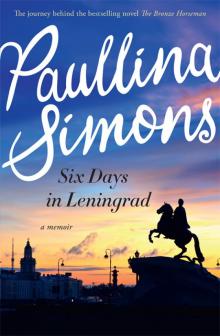 Six Days in Leningrad
Six Days in Leningrad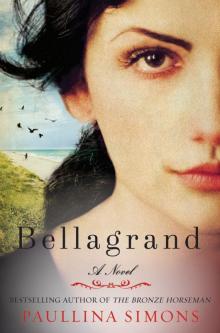 Bellagrand
Bellagrand Tatiana and Alexander
Tatiana and Alexander Road to Paradise
Road to Paradise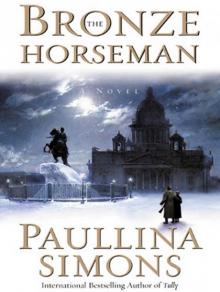 The Bronze Horseman
The Bronze Horseman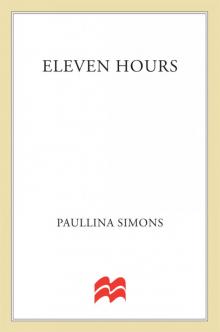 Eleven Hours
Eleven Hours Tatiana's Table: Tatiana and Alexander's Life of Food and Love
Tatiana's Table: Tatiana and Alexander's Life of Food and Love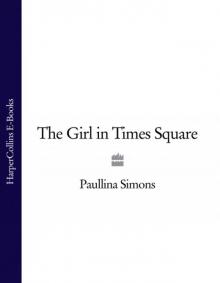 The Girl in Times Square
The Girl in Times Square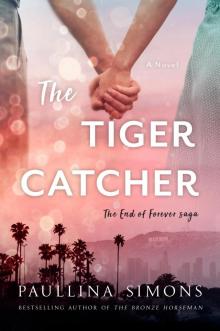 The Tiger Catcher
The Tiger Catcher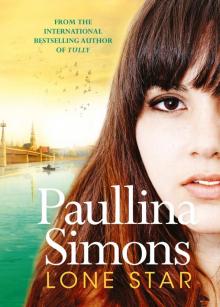 Lone Star
Lone Star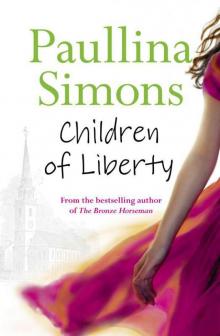 Children of Liberty
Children of Liberty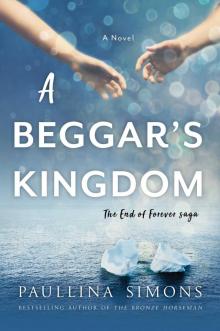 A Beggar's Kingdom
A Beggar's Kingdom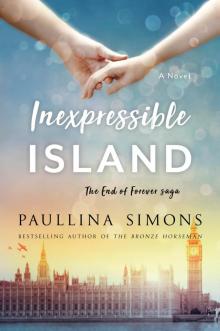 Inexpressible Island
Inexpressible Island Tatiana and Alexander: A Novel
Tatiana and Alexander: A Novel Tatiana's Table
Tatiana's Table A Song in the Daylight (2009)
A Song in the Daylight (2009)